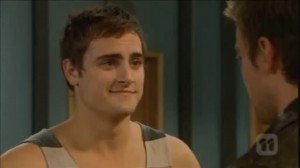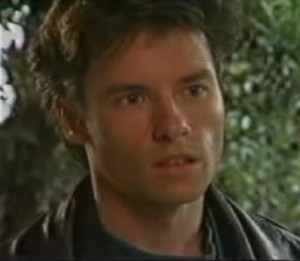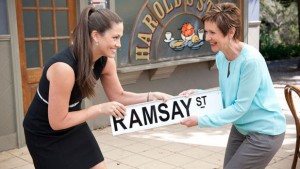
A gradual but inevitable descent into cricket-based loathing and bile.
Whatever Happened To The Unlikely Lads (International Edition)? #39: Mick Lewis
In our two or so years of posting self-indulgent twaddle on the internet, we’ve come in for our fair share of abuse. Actually we’ve had more than our fair share: Adam Dibble called us a rude word for pointing out that Jos Buttler hadn’t made an overly successful start to his England career, Liam Plunkett called us Muppets for suggesting that he looks like the Honey Monster and even Devereux ignored our desperate pleading for his signature in Taunton, despite the fact that some of us had traveled halfway around the world to see him.
Anyway, we’ve developed pretty thick skin over the last two years, partly due to the abuse and partly because Editor Steve likes to think he’s Indiana Jones, often waving a very nasty whip around the office (and occasionally hiding in the fridge to ‘escape from nuclear explosions’). And at least we don’t have the phrase WORST ONE DAY BOWLING FIGURES EVER! written next to our name on the internet, which is more than can be said for our latest Unlikely Lad.
#39: Michael Llewellyn Lewis
The Mick Lewis story is an unusual one. While most players are targeted as future stars from a young age and placed on the treadmill towards success – winters at the academy, ‘A’ tours and so on – Lewis was an exception, coming to the game much later. He didn’t even make his ODI debut until December 2005 at the age of 31, an age at which knees begin to creak, dreams begin to die and mortgages become smothering beasts, sucking the life out of relationships. And what a debut it was, Lewis (appearing as a supersub in the ICC’s latest gin-induced shambles) taking three wickets before running out Kyle Mills in the final over as Australia beat New Zealand by two runs in Wellington.
Lewis’s second appearance was a rather more chilling premonition of what was to come, with him conceding 77 from his nine overs as New Zealand chased down 332 in what was also Mitchell Johnson’s ODI debut. Perhaps everyone was distracted by Mitch lurching into the crease and spraying the ball everywhere, setting a template for the next decade of international cricket. Or maybe they were just too drunk to care.
Lewis then dropped out of the Australian side before reappearing to contribute little of note in the last two finals of the following year’s VB Series. Despite that, it was enough to get him on Australia’s tour of South Africa where he played the first game (which South Africa won) and the fourth (where Lewis scored the winning runs as Australia squeaked home by one wicket to square the series at 2-2). And so on to Johannesburg.
The fifth ODI has gone down in legend as probably the greatest of all time, even better than Scotland vs. England in 2012. With Mick Lewis presumably sat with his feet up and a beer in his hand, Australia racked up the small matter of 434/4 from their 50 overs. Ricky Ponting made 164 from 105 balls, Mike Hussey 81 from 51 and Simon Katich 79 from 90. It was genuine carnage and utterly exhilarating to watch, unless you were actually Mike Hussey, who managed to make it sound all rather humdrum and run of the mill.
After the batsmen had done their bit, there was just the small matter of the bowlers seeing out the job. Of course, they utterly failed to do this, despite Nathan Bracken taking 5/67. On the flattest of flat pitches, with nothing happening in the air and the batsmen looking to score at nine an over from the off, Lewis was cannon fodder. His first over went for nine runs, his second for 14, then came four and another nine before a retreat to the outfield to nurse figures of 4-0-32-0 with South Africa 138/1 from 17 overs and Graeme Smith and Herschelle Gibbs flying along.
Smith eventually holed out on 90 while Gibbs carried on to his hundred before Lewis returned in the powerplay. In the grand scheme of things, that might have been an error on Ricky’s Ponting’s part as 18 runs came from the over, including a no-ball mowed for six over the leg side.
Like an ill-treated wife worn down by years of violence and misguided loyalty, Ponting stuck with his man and was rewarded with a single tight over, going for just five. But normal service soon resumed as the next one disappeared for 18; Herschelle Gibbs reaching 150 in a display so aggressive and violent it could easily have happened outside the stadium.
So far so bad for Mick Lewis: seven overs and 0/72. At this point he was taken out of the attack, saved for the final overs. When he finally had the ball in his hand again 43 overs had gone, South Africa were 358/6 and Johan van der Wath was on strike. And no, we don’t know who that is either. Whoever he is, he tucked into Mick Lewis’s bowling like a true Aussie battler taking on a Mrs Mac’s pie, helping himself to a couple of sixes and 16 runs from the over.
And yet Lewis still stayed in the attack, despite it meaning Brett Lee wouldn’t bowl his full complement. Quite why Ricky Ponting thought this was a good idea, we have no idea. Perhaps he explains it in his recent autobiography, but at 560 odd pages, he can expect to receive a fairly hefty medical bill if he wants us to just lift the bloody thing, let alone read it. Anyway, Lewis went for nine more runs taking him to 9-0-96-0.
At this point the century mark had only been reached once in the history of ODIs, by New Zealand’s Martin Snedden, who took 0/105 against England in 1983. Lewis passed the hundred mark from the first ball of his final over, Mark Boucher once again carting him to the boundary. Another two runs and another boundary took Lewis past Snedden’s record before a one/two/boundary finish added the icing to the cake. Lewis’s final figures were 10-0-113-0.
Although our hero’s torture was over, there was the small matter of the last two overs to complete, South Africa eventually edging home with one wicket and one ball to spare. It was utterly breathless stuff. If you’ve got 55 minutes to spare you can enjoy the whole splendid set of highlights right here:
In a not entirely unsurprising development, Mick Lewis never played for Australia again. He lost his Cricket Australia contract rather swiftly, before suffering injuries and loss of form and drifting away from the game. And then somebody king-hit him in the street. But his name will forever be immortalised for that one day, when records galore were broken, much like the man himself. And at least people have probably stopped abusing him on Twitter for it by now.





No Comments
Post a Comment